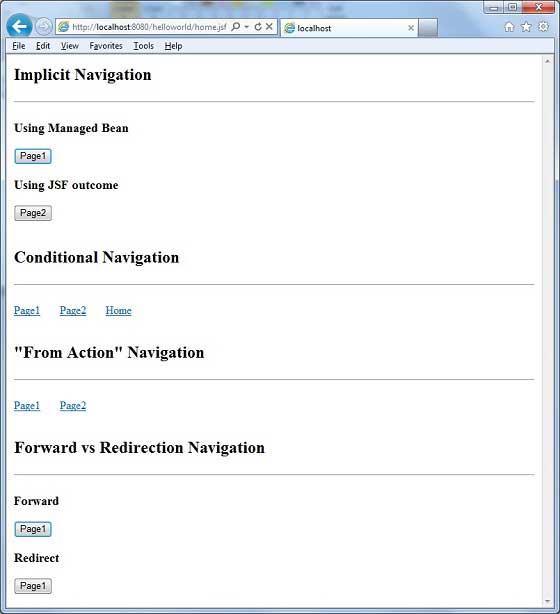JSF - 页面导航( Page Navigation)
导航规则是JSF Framework提供的那些规则,用于描述单击按钮或链接时要显示的视图。
可以在名为faces-config.xml的JSF配置文件中定义导航规则。 它们可以在托管bean中定义。
导航规则可以包含可以显示结果视图的条件。 JSF 2.0也提供隐式导航,其中不需要定义导航规则。
隐式导航
JSF 2.0提供了名为implicit navigation auto view page resolver机制。 在这种情况下,您只需要将视图名称放在action属性中,JSF将在已部署的应用程序中自动搜索正确的view页面。
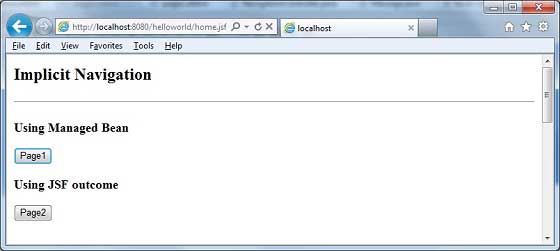
JSF页面中的自动导航
在任何JSF UI组件的action属性中设置视图名称。
<h:form>
<h3>Using JSF outcome</h3>
<h:commandButton action = "page2" value = "Page2" />
</h:form>
这里,当单击Page2按钮时,JSF将解析视图名称page2作为page2.xhtml扩展名,并在当前目录中找到相应的视图文件page2.xhtml 。
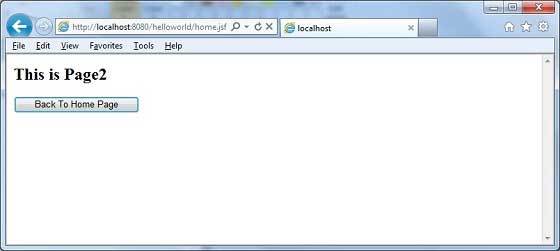
托管Bean中的自动导航
在托管bean中定义一个方法以返回视图名称。
@ManagedBean(name = "navigationController", eager = true)
@RequestScoped
public class NavigationController implements Serializable {
public String moveToPage1() {
return "page1";
}
}
使用托管bean获取任何JSF UI Component的action属性中的视图名称。
<h:form>
<h3> Using Managed Bean</h3>
<h:commandButton action = "#{navigationController.moveToPage1}"
value = "Page1" /glt;
</h:form>
这里,当单击Page1按钮时,JSF将解析视图名称page1作为page1.xhtml扩展名,并在当前目录中找到相应的视图文件page1.xhtml 。
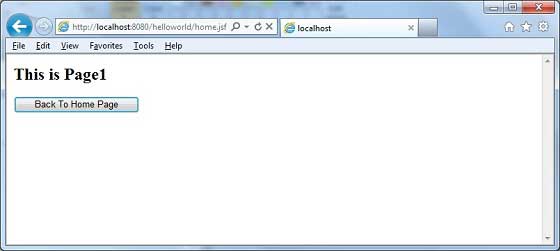
条件导航
使用托管bean,我们可以非常轻松地控制导航。 查看托管bean中的以下代码。
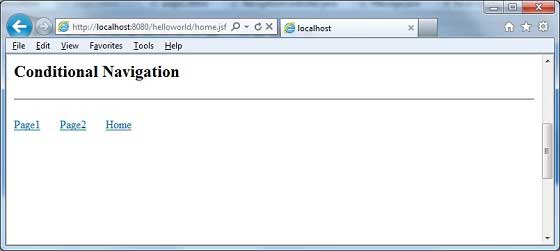
@ManagedBean(name = "navigationController", eager = true)
@RequestScoped
public class NavigationController implements Serializable {
//this managed property will read value from request parameter pageId
@ManagedProperty(value = "#{param.pageId}")
private String pageId;
//condional navigation based on pageId
//if pageId is 1 show page1.xhtml,
//if pageId is 2 show page2.xhtml
//else show home.xhtml
public String showPage() {
if(pageId == null) {
return "home";
}
if(pageId.equals("1")) {
return "page1";
}else if(pageId.equals("2")) {
return "page2";
}else {
return "home";
}
}
}
将pageId作为JSF UI Component中的请求参数传递。
<h:form>
<h:commandLink action = "#{navigationController.showPage}" value = "Page1">
<f:param name = "pageId" value = "1" />
</h:commandLink>
<h:commandLink action = "#{navigationController.showPage}" value = "Page2">
<f:param name = "pageId" value = "2" />
</h:commandLink>
<h:commandLink action = "#{navigationController.showPage}" value = "Home">
<f:param name = "pageId" value = "3" />
</h:commandLink>
</h:form>
在这里,单击“Page1”按钮。
JSF将使用参数pageId = 1创建请求
然后JSF将此参数传递给navigationController的托管属性pageId
现在调用navigationController.showPage(),它将在检查pageId后将视图返回到page1
JSF将视图名称page1解析为page1.xhtml扩展名
在当前目录中找到相应的视图文件page1.xhtml

基于from-action解决导航问题
即使托管bean不同的方法返回相同的视图名称,JSF也提供导航解析选项。
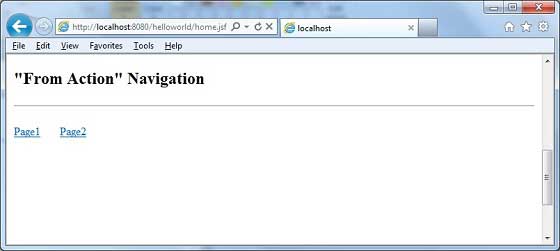
查看托管bean中的以下代码。
public String processPage1() {
return "page";
}
public String processPage2() {
return "page";
}
要解析视图,请在faces-config.xml定义以下导航规则
<navigation-rule>
<from-view-id>home.xhtml</from-view-id>
<navigation-case>
<from-action>#{navigationController.processPage1}</from-action>
<from-outcome>page</from-outcome>
<to-view-id>page1.jsf</to-view-id>
</navigation-case>
<navigation-case>
<from-action>#{navigationController.processPage2}</from-action>
<from-outcome>page</from-outcome>
<to-view-id>page2.jsf</to-view-id>
</navigation-case>
</navigation-rule>
在这里,当点击Page1按钮时 -
调用navigationController.processPage1() ,它将视图作为页面返回
JSF将解析视图名称page1因为视图名称是page and from-action faces-config is navigationController.processPage1 page and from-action faces-config is navigationController.processPage1
在当前目录中找到相应的视图文件page1.xhtml

转发与重定向
默认情况下,JSF在导航到另一个页面时执行服务器页面,并且应用程序的URL不会更改。
要启用页面重定向,请在视图名称的末尾追加faces-redirect=true 。
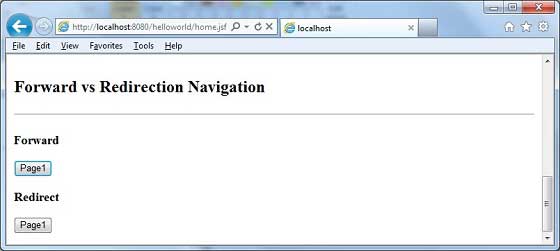
<h:form>
<h3>Forward</h3>
<h:commandButton action = "page1" value = "Page1" />
<h3>Redirect</h3>
<h:commandButton action = "page1?faces-redirect = true" value = "Page1" />
</h:form>
这里,当单击Forward下的Page1按钮时,您将得到以下结果。

在单击Redirect下的Page1按钮时,您将获得以下结果。
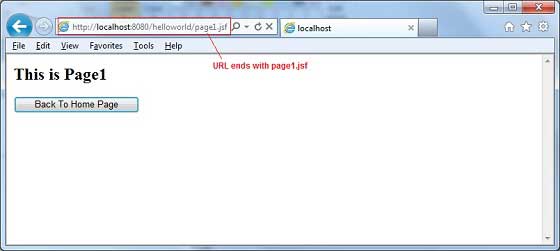
示例应用
让我们创建一个测试JSF应用程序来测试所有上面的导航示例。
| 步 | 描述 |
|---|---|
| 1 | 在package com.iowiki.test下创建一个名为helloworld的项目,如JSF - Create Application一章中所述。 |
| 2 | 在com.iowiki.test包下创建NavigationController.java ,如下所述。 |
| 3 | 在WEB-INF文件夹下创建faces-config.xml并更新其内容,如下所述。 |
| 4 | 更新WEB-INF文件夹下的web.xml ,如下所述。 |
| 5 | 创建page1.xhtml和page2.xhtml并在webapp文件夹下修改home.xhtml ,如下所述。 |
| 6 | 编译并运行应用程序以确保业务逻辑按照要求运行。 |
| 7 | 最后,以war文件的形式构建应用程序并将其部署在Apache Tomcat Webserver中。 |
| 8 | 使用适当的URL启动Web应用程序,如下面的最后一步所述。 |
NavigationController.java
package com.iowiki.test;
import java.io.Serializable;
import javax.faces.bean.ManagedBean;
import javax.faces.bean.ManagedProperty;
import javax.faces.bean.RequestScoped;
@ManagedBean(name = "navigationController", eager = true)
@RequestScoped
public class NavigationController implements Serializable {
private static final long serialVersionUID = 1L;
@ManagedProperty(value = "#{param.pageId}")
private String pageId;
public String moveToPage1() {
return "page1";
}
public String moveToPage2() {
return "page2";
}
public String moveToHomePage() {
return "home";
}
public String processPage1() {
return "page";
}
public String processPage2() {
return "page";
}
public String showPage() {
if(pageId == null) {
return "home";
}
if(pageId.equals("1")) {
return "page1";
}else if(pageId.equals("2")) {
return "page2";
}else {
return "home";
}
}
public String getPageId() {
return pageId;
}
public void setPageId(String pageId) {
this.pageId = pageId;
}
}
faces-config.xml
<?xml version = "1.0" encoding = "UTF-8"?>
<faces-config
xmlns = "http://java.sun.com/xml/ns/javaee"
xmlns:xsi = "http://www.w3.org/2001/XMLSchema-instance"
xsi:schemaLocation = "http://java.sun.com/xml/ns/javaee
http://java.sun.com/xml/ns/javaee/web-facesconfig_2_0.xsd"
version = "2.0">
<navigation-rule>
<from-view-id>home.xhtml</from-view-id>
<navigation-case>
<from-action>#{navigationController.processPage1}</from-action>
<from-outcome>page</from-outcome>
<to-view-id>page1.jsf</to-view-id>
</navigation-case>
<navigation-case>
<from-action>#{navigationController.processPage2}</from-action>
<from-outcome>page</from-outcome>
<to-view-id>page2.jsf</to-view-id>
</navigation-case>
</navigation-rule>
</faces-config>
web.xml
<!DOCTYPE web-app PUBLIC
"-//Sun Microsystems, Inc.//DTD Web Application 2.3//EN"
"http://java.sun.com/dtd/web-app_2_3.dtd" >
<web-app>
<display-name>Archetype Created Web Application</display-name>
<context-param>
<param-name>javax.faces.PROJECT_STAGE</param-name>
<param-value>Development</param-value>
</context-param>
<context-param>
<param-name>javax.faces.CONFIG_FILES</param-name>
<param-value>/WEB-INF/faces-config.xml</param-value>
</context-param>
<servlet>
<servlet-name>Faces Servlet</servlet-name>
<servlet-class>javax.faces.webapp.FacesServlet</servlet-class>
</servlet>
<servlet-mapping>
<servlet-name>Faces Servlet</servlet-name>
<url-pattern>*.jsf</url-pattern>
</servlet-mapping>
</web-app>
page1.xhtml
<?xml version = "1.0" encoding = "UTF-8"?>
<!DOCTYPE html PUBLIC "-//W3C//DTD XHTML 1.0 Transitional//EN"
"http://www.w3.org/TR/xhtml1/DTD/xhtml1-transitional.dtd">
<html xmlns = "http://www.w3.org/1999/xhtml"
xmlns:h = "http://java.sun.com/jsf/html">
<h:body>
<h2>This is Page1</h2>
<h:form>
<h:commandButton action = "home?faces-redirect = true"
value = "Back To Home Page" />
</h:form>
</h:body>
</html>
page2.xhtml
<?xml version = "1.0" encoding = "UTF-8"?>
<!DOCTYPE html PUBLIC "-//W3C//DTD XHTML 1.0 Transitional//EN"
"http://www.w3.org/TR/xhtml1/DTD/xhtml1-transitional.dtd">
<html xmlns = "http://www.w3.org/1999/xhtml"
xmlns:h = "http://java.sun.com/jsf/html">
<h:body>
<h2>This is Page2</h2>
<h:form>
<h:commandButton action = "home?faces-redirect = true"
value = "Back To Home Page" />
</h:form>
</h:body>
</html>
home.xhtml
<?xml version = "1.0" encoding = "UTF-8"?>
<!DOCTYPE html PUBLIC "-//W3C//DTD XHTML 1.0 Transitional//EN"
"http://www.w3.org/TR/xhtml1/DTD/xhtml1-transitional.dtd">
<html xmlns = "http://www.w3.org/1999/xhtml"
xmlns:f = "http://java.sun.com/jsf/core"
xmlns:h = "http://java.sun.com/jsf/html">
<h:body>
<h2>Implicit Navigation</h2>
<hr />
<h:form>
<h3>Using Managed Bean</h3>
<h:commandButton action = "#{navigationController.moveToPage1}"
value = "Page1" />
<h3>Using JSF outcome</h3>
<h:commandButton action = "page2" value = "Page2" />
</h:form>
<br/>
<h2>Conditional Navigation</h2>
<hr />
<h:form>
<h:commandLink action = "#{navigationController.showPage}"
value="Page1">
<f:param name = "pageId" value = "1" />
</h:commandLink>
<h:commandLink action = "#{navigationController.showPage}"
value="Page2">
<f:param name = "pageId" value = "2" />
</h:commandLink>
<h:commandLink action = "#{navigationController.showPage}"
value = "Home">
<f:param name = "pageId" value = "3" />
</h:commandLink>
</h:form>
<br/>
<h2>"From Action" Navigation</h2>
<hr />
<h:form>
<h:commandLink action = "#{navigationController.processPage1}"
value = "Page1" />
<h:commandLink action = "#{navigationController.processPage2}"
value = "Page2" />
</h:form>
<br/>
<h2>Forward vs Redirection Navigation</h2>
<hr />
<h:form>
<h3>Forward</h3>
<h:commandButton action = "page1" value = "Page1" />
<h3>Redirect</h3>
<h:commandButton action = "page1?faces-redirect = true"
value = "Page1" />
</h:form>
</h:body>
</html>
一旦准备好完成所有更改,让我们编译并运行应用程序,就像我们在JSF - 创建应用程序章节中所做的那样。 如果您的应用程序一切正常,这将产生以下结果。
